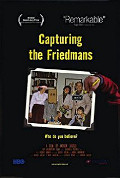
Directed by
Andrew Jarecki
107 minutes
Rated MA
Reviewed by
Ruth Williams

Capturing The Friedmans
Synopsis:: A feature-length documentary that explores the way in which the Friedman family of Great Neck, Long Island, cope, or more exactly, don’t cope, when the father, Arnold, and eighteen year old son, Jesse, were accused of child molestation in the late 1980s.Capturing The Friedmans is ‘unscripted drama’ at its best. Thanks to the fact that the family kept a visual record of their development through the use of home movies that go back to before the children were born, and were still being shot the evening before the father goes to jail and Jesse fronts the court, we have a compelling account of a apparently normal middle-class suburban world unravelling before our eyes.
Andrew Jarecki was interviewing David Freidman, the eldest son, for another film project when he mentioned what had happened to his father and how the event had affected his life. Whilst David, perhaps naïvely, agreed to be involved in the documentary because he felt that it might help his younger brother, Jesse, in his appeal to be released from prison, ultimately he felt that the final cut did not emphasise the innocence of his family with enough conviction. Yet at least from an audience’s perspective, one of the resonant features of this film is that even though there a numerous interviews with people from both sides of the story, you don’t necessarily come out of it any clearer as to what actually happened.
Jarecki has not delivered an open-and-shut defence but, whatever the truth of the case, he has given us a case study of the way in which the courts, the media and local communities can make up their minds based less on fact than emotional bias. Once the link with child pornography was substantiated, the Friedmans didn’t really have a chance to defend themselves against more grievous charges.
We are reminded that, in general, in a world where spin is in, it is difficult to know who to believe. Friedman’s wife, Emily does not come across in a very sympathetic light, and yet she offers one of the most honest answers in the film. When asked if she believes her husband is guilty, she simply responds that she doesn’t know. This is anathema to her sons, who see it as the ultimate betrayal. It’s not easy to inhabit the space of not knowing, but surely it is preferable to jumping to conclusions that result in the destruction of a family and the incarceration of a young man who is more a victim than a monster.

Want more about this film?


Want something different?




